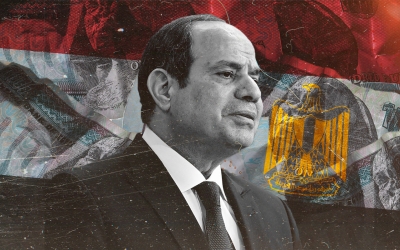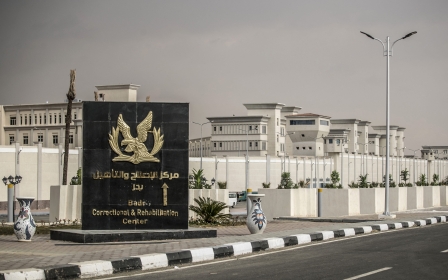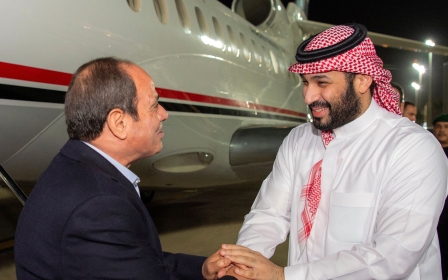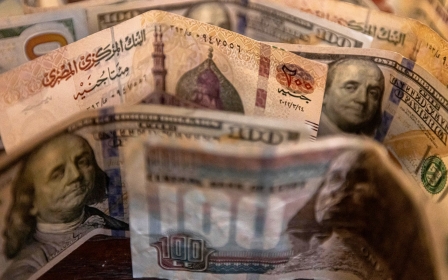IMF delays Egypt's bailout review as reforms stall

The International Monetary Fund wants to see Egypt accelerate reforms before it carries out its first review of a $3bn rescue programme intended to shore up the North African country's crippled economy.
In December, the IMF approved its fourth loan to Egypt in six years. As part of a $3bn deal, Cairo agreed to shift to a flexible exchange rate, reduce the military’s footprint in the economy and open the books of state-owned companies.
But disbursements under the 46-month programme are subject to eight reviews, the first of which was dated 15 March 2023, but it has yet to take place. According to Bloomberg, the lender is holding off until it sees more progress from Cairo to ensure the review is successful.
The stall comes amid a series of statements suggesting frustration with Cairo's willingness to carry out reforms and concerns over the health of Egypt’s economy.
Ferid Belhaj, the World Bank’s vice president for the Middle East and North Africa, recently said Egypt was not moving fast enough to address an economic crisis that has sent the cost of basic goods skyrocketing and pushed millions into poverty.
“What we see today in Egypt is a situation that is not as stable as we would like it to be."
Egypt's reluctance to move away from a de facto peg of its currency to the US dollar is one of the main holdups. Although the Egyptian pound has lost about half its official value over the past year, analysts say it is still overvalued.
Successive Egyptian governments have been reluctant to let the pound drop in value over concerns that it will push inflation higher, potentially destabilising the country. But devaluing the pound is seen as key to attracting international investment to Egypt.
Meanwhile, Cairo’s long-awaited privatisation drive appears to have stalled.
In February, Egypt announced a plan to sell stakes in at least 32 state-owned companies by the end of March 2024. In a sign of slow progress, Egypt suspended the sale of a stake in state-controlled Telecom Egypt, citing "market conditions”.
President Abdel Fattah el-Sisi, a one-time general who rose to power after the overthrow of former President Mohamed Morsi, expanded the state's historic role in Egypt's economic life, catapulting the army into a dominant position of power.
Today, Egypt’s military controls everything from cement factories to grocery stores and malls. Analysts who spoke to Middle East Eye previously said they are skeptical Sisi will ever loosen the military’s grip.
“Wholesale reform threatens the privileged position of the military in the economy - making such reforms unlikely," Hamish Kinnear, from risk advisory firm Verisk Maplecroft, told MEE.
Gulf states that have traditionally supported Egypt vowed to invest billions of dollars in its economy, but there is scant sign of major investments going through.
Earlier this month, Sisi made a surprise visit to Saudi Arabia and met Crown Prince Mohammed bin Salman, in a bid to drum up support. But the kingdom has said publicly it is no longer interested in giving unconditional aid.
Saudi Finance Minister Mohammed al-Jadaan, speaking at the World Economic Forum in Davos in January, warned that his country will no longer give aid to others without reforms.
"We used to give direct grants and deposits without strings attached," Jadaan said. "And we are changing that. We are working with multilateral institutions to actually say, 'We need to see reforms.’"
The IMF has called the Gulf states’ support “a critical part” of its $3bn bailout programme.
The Arab world’s most populous nation was hit hard by the dual impacts of the Russia-Ukraine war and the Covid-19 pandemic which raised the price of imported goods.
Foreign investors pulled $22bn from Egypt’s debt market last year and they have been reluctant to re-enter when rising interest rates in the West have dented the appeal of Egyptian debt.
Middle East Eye propose une couverture et une analyse indépendantes et incomparables du Moyen-Orient, de l’Afrique du Nord et d’autres régions du monde. Pour en savoir plus sur la reprise de ce contenu et les frais qui s’appliquent, veuillez remplir ce formulaire [en anglais]. Pour en savoir plus sur MEE, cliquez ici [en anglais].





